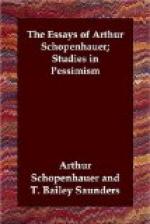The whole foundation on which our existence rests is the present—the ever-fleeting present. It lies, then, in the very nature of our existence to take the form of constant motion, and to offer no possibility of our ever attaining the rest for which we are always striving. We are like a man running downhill, who cannot keep on his legs unless he runs on, and will inevitably fall if he stops; or, again, like a pole balanced on the tip of one’s finger; or like a planet, which would fall into its sun the moment it ceased to hurry forward on its way. Unrest is the mark of existence.
In a world where all is unstable, and nought can endure, but is swept onwards at once in the hurrying whirlpool of change; where a man, if he is to keep erect at all, must always be advancing and moving, like an acrobat on a rope—in such a world, happiness in inconceivable. How can it dwell where, as Plato says, continual Becoming and never Being is the sole form of existence? In the first place, a man never is happy, but spends his whole life in striving after something which he thinks will make him so; he seldom attains his goal, and when he does, it is only to be disappointed; he is mostly shipwrecked in the end, and comes into harbor with masts and rigging gone. And then, it is all one whether he has been happy or miserable; for his life was never anything more than a present moment always vanishing; and now it is over.
At the same time it is a wonderful thing that, in the world of human beings as in that of animals in general, this manifold restless motion is produced and kept up by the agency of two simple impulses—hunger and the sexual instinct; aided a little, perhaps, by the influence of boredom, but by nothing else; and that, in the theatre of life, these suffice to form the primum mobile of how complicated a machinery, setting in motion how strange and varied a scene!
On looking a little closer, we find that inorganic matter presents a constant conflict between chemical forces, which eventually works dissolution; and on the other hand, that organic life is impossible without continual change of matter, and cannot exist if it does not receive perpetual help from without. This is the realm of finality; and its opposite would be an infinite existence, exposed to no attack from without, and needing nothing to support it; [Greek: haei hosautos dn], the realm of eternal peace; [Greek: oute giguomenon oute apollumenon], some timeless, changeless state, one and undiversified; the negative knowledge of which forms the dominant note of the Platonic philosophy. It is to some such state as this that the denial of the will to live opens up the way.




